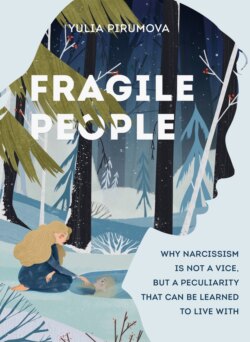Читать книгу Fragile People: a Hidden Door into the World of Narcissists - Юлия Пирумова - Страница 13
Introduction
Questionnaire for identifying narcissistic deficiency
ОглавлениеI am pretty sure that having reached this page you have started to suspect deficient narcissism in yourself. At least, a light form. To provide you with some reference, I have prepared questions which would enable you to check how true your suspicions are.
Just answer “yes” or “no”, without thinking for too long. And believe me: even if you give a positive answer to the majority of questions in this questionnaire, it does not mean that you are a “rabid” narcissist. It is just that the narcissistic sphere of your personality is pretty vulnerable due to the circumstances of your life. We will talk about it in detail further on.
In the meantime, enjoy!
Statements connected with self-esteem
• My self-esteem greatly depends on what is happening in my life at the moment.
• Troubles and misfortunes leave me with a sense of inferiority for a long time.
• I rarely feel worthy and respected.
• I keep doubting my value and worth for the people around me.
• I often feel inappropriate when I contact with people.
• I never measure up to the ideal I set for myself.
• I can't see anything in myself that would make me unique as compared to other people.
• I have no virtues to be proud of.
• I don't know my strengths.
• I don't know what I could be loved, valued or respected for.
• I feel desperate when I think that I am an ordinary person, one of many.
• I often compare myself to the others. Not to my advantage.
• I feel overwhelmed by other people's success. When I compare myself to them, I instantly get absorbed in gloomy worthlessness.
• If I understand that in some way I'm worse than other people, I get overtaken by the feeling of unworthiness.
• I constantly criticize myself and devalue what I've done and achieved.
• I believe that if people discover who I really am, they will get irreversibly disappointed in me.
• When people look at me, I see criticism and judgement more often than benevolence and interest.
• Because of my flaws and the mistakes I've made in life, I'm much worse than the people surrounding me.
• My achievements and success do not convince me that I'm sufficiently competent or professional.
• I often feel like an impostor and I'm afraid that it will become evident to other people.
Statements to do with relationships with other people
• I often notice thinking that I feel better without people, since this way I can avoid the feeling of shame.
• If surrounded by people, I feel that there's something wrong with me.
• I believe that people around me are normal, but I'm sure that I'm not one of them.
• I don't like competition. It is associated with high risk of being worse than someone else.
• I can't imagine someone showing their condescending attitude to my flaws. It would be better for me not to reveal them to anyone under any circumstances.
• If I accept that I have many virtues, I'll have to always strive to live up to them and feel tense in order not to disappoint other people.
• Most of all I'm afraid of depending on other people.
• Asking for help makes me feel humiliated. It would be good if people voluntarily did for me what I needed, since, in turn, I do all I can for them.
• I don't understand why people need a relationship which does not involve mutual benefit.
• My goal is not to need people and cope with everything by myself.
Mental mindsets
• I'm often anxious about not being able to relax, since I have to move on; otherwise I'll always be “nobody”.
• I have to constantly prove to myself that I'm able to do many things in order to feel that there's nothing wrong with me.
• I don't gain satisfaction from achievements and success. After I've climbed another step, I must immediately move forward.
• I definitely cope with my life worse than the people around me.
• Criteria of success in life: beauty, strength, wealth, and power.
• I believe that clever people do not make mistakes.
• I believe that if you try hard, you can manage the events of your life.
• I can't accept the fact that some events happened in my life. I would prefer to have a different life story.
• I think it's humiliating for people to be dependent.
• Affection makes people dependent on each other, and that's dangerous.
• There is no point in pure enjoyment which brings no benefit.
• You shouldn't start something new if you're not perfectly sure of the result.
• If I started doing something, I would ask a perfect performance of myself, even if it wears me out.
Perhaps, having answered the questions, you have got confused: “Narcissism is the last thing I need!” But you are completely wrong. It seems that healthy narcissism, which would provide a stable foundation for your self-esteem, self-respect, and confidence while communicating with people is just what you need. The subsequent parts of the book will take us to the world of narcissistic health and wounds of this sphere. But before that… Just a few more words in defense of narcissists.
